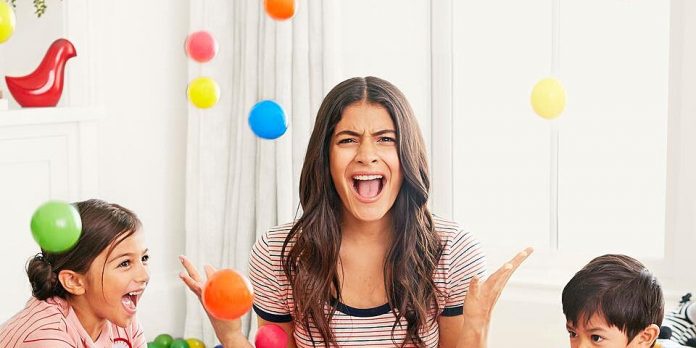I understand, no one wants to yell and certainly no one wants to be yelled at.
I was yelled at as a kid, and I’m willing to bet you were too. But let me ask you…
Do you feel like if you don’t yell, they won’t listen?
You’re not alone; in fact, when I ask parents this same question, most of them think they have to yell for their kids to listen.
The good news is that you don’t have to yell, you really don’t.
I know, you’re probably saying, “You’ve obviously never been to my house” or “You’re one of those parenting coaches who has never raised children”. Well, let me assure you that I have not only raised children, but I have raised five children, all of whom are in their early to late thirties, and for 25 of those years and still going, I have parented in a mixed marriage (two for me, three for him), and we have successfully brought these wonderful children into adulthood, all without a shout. Today, all five of our children are raising their own children and doing so in a cooperative and peaceful manner.
The truth is that I have worked with many parents and children for about 40 years, and although I have never been to your home, I have coached many parents who believe everything you do and feel like their home is different.
It all comes down to these few things: Communication, respect, trust, consistency and the ability to understand your child. It’s about your behavior – that’s right, yours, not theirs. You are their biggest role model and they watch your every move, so give them good things to watch and copy. In reality, everything you do, you give your children permission to do. So if you yell all the time, they will too.
Put these steps into practice and everyone in your family will start smiling a lot more and you will be on your way to family harmony. Your child will be thrilled! Why? Because no one is yelling at them anymore and making them feel like crap.
Will it change overnight and become the perfect home overnight? Absolutely not! You didn’t create this stressful atmosphere in one day, it’s not going to disappear in one day. Will every day, once you’ve mastered these techniques, be perfect? Sorry to say, no. You may scream from time to time, your child may scream from time to time, but it won’t be every day, or even almost every day, or hopefully even every week. But let’s face it, we’re all human, we all have good days and bad days, and we all get irritable and react in ways we didn’t expect. It happens to the best of us, yes, even to me.
Don’t think you have to be perfect to stop yelling, you just have to be more intentional about it and start creating a calm, cooperative atmosphere where you talk to each other calmly and respectfully, where you think before you react, and everyone in the family learns to do the same. You start to become proactive instead of reactive.
Before we move on to what you need to know about how to stop yelling, there is one really important fact that all parents need to remember during their parenting journey. The human brain does not fully develop until age 25. That’s right, 25 years old is crazy, right? Just imagine what kind of underdeveloped brain your child has. If your child is a toddler, his or her brain is mostly filled with emotions without knowing how to react to or control those emotions. That’s a great moment of clarity, right? Think about your teenager, an underdeveloped brain with the added need to belong, take risks and hang out with friends. Ahhh, it all starts to make sense now. Your job is to teach, coach, guide, make the necessary connections in their brain and stop expecting them to react to you like adults. This is not only difficult, it’s impossible.
Let’s take a minute to think about how we speak.
Do you smile when you speak? Are you using your manners? Are you friendly and respectful? If you have a spouse or partner, how do you talk to yourself? How do they talk to your children? What facial expressions do your children see from you? Do you use profanity, call them names, and/or label them with things like “lazy,” “stupid,” “liar,” “little shits” (I mention that last one because I know children who were called that for most of their childhood)?
As I said before, kids do what you do. Children will talk the way they hear you and see you talk.
If you yell, they will yell. If you are quiet, they are quiet. If you yell, they will yell. If you insult them, they will insult them. Do you understand? It’s a simple case of “Monkey See, Monkey Do”.
It’s time to examine the way you speak. Did you know that 70% of communication is non-verbal? The words you speak only account for 30% of it. Start thinking about it and if you need to practice calmer communication, today is the day to start.
A family meeting is a family discussion in a safe, calm and relaxed atmosphere where you can discuss different topics and offer your children the opportunity to express their opinions and ideas to solve problems or create new plans, without judgment or criticism. Tip: It will do your relationship good if you can put your children’s ideas into action.
If a particular problem recurs and causes you to yell at your child, you should impose an appropriate consequence if the problem recurs. That way, instead of yelling the next time, her behavior will result in the chosen consequence.
Remember, consequences are meant to teach, not punish. Consequences should be discussed with your child ahead of time and, better yet, work with him to come up with his own consequence. He or she will comply better if it is his or her idea.
Most parents say they yell because they are gently asking their child, over and over again, to do something. After four or five times, they are forced to yell, and only then does their child finally listen. Can you understand?
Let’s solve this problem right now. The problem is not that he doesn’t listen the first time, but that he knows you’re going to keep asking him and he’s learned that he doesn’t have to listen the first time, that he can wait for you to yell (that’s when he knows you mean it and mean what you say). So here’s what you need to do:
Remember the consequences you put in place? Okay, tell your child that the next time the problem (whatever it is) comes up, the consequence you discussed will be put in place. Let them know that you will ask them once and if they don’t do it, there will be a consequence for that decision. At first they may not believe you because it has never happened before, but if you do it right, they will learn that you are serious after a few days. Now the rest is up to you.
When it happens again, if your child doesn’t listen, they will suffer the consequences of their actions, whatever they are. You need to be consistent every time the behavior happens and put that consequence in place, so he learns to make the best choice and listen the first time. It is through consistency that this will become a reality. Once and for all!










